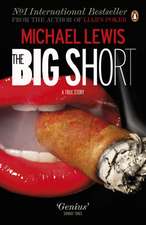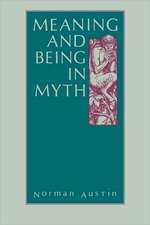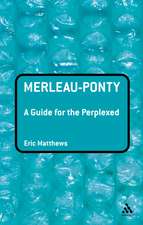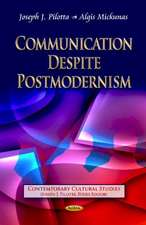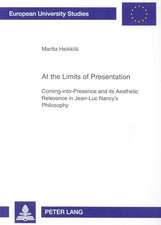Phenomenology: An Introduction
Autor Dr Michael Lewis, Dr Tanja Staehleren Limba Engleză Paperback – 3 noi 2010
This book provides a concise and comprehensive introduction to the concept of phenomenology, perhaps the most important and influential movement in twentieth century philosophy.
It explains the development of the phenomenological method in the works of four thinkers: Edmund Husserl, Martin Heidegger, Jean-Paul Sartre, and Maurice Merleau-Ponty. It also addresses the criticisms directed at phenomenology by Emmanuel Levinas and Jacques Derrida, and the ways in which phenomenology has continued to flourish in spite of such critique, in the work of Michel Henry and Jean-Luc Marion.
The text includes many helpful features such as key definitions, sample essay and exam questions, an extensive bibliography, and suggested readings for each topic covered, making the book an ideal companion to any course in phenomenology and phenomenological thinkers. The book presupposes no prior knowledge on the part of the reader, making it suitable for those encountering phenomenology for the first time, but it also provides an original interpretation that will be of lasting value to postgraduates and scholars.
It explains the development of the phenomenological method in the works of four thinkers: Edmund Husserl, Martin Heidegger, Jean-Paul Sartre, and Maurice Merleau-Ponty. It also addresses the criticisms directed at phenomenology by Emmanuel Levinas and Jacques Derrida, and the ways in which phenomenology has continued to flourish in spite of such critique, in the work of Michel Henry and Jean-Luc Marion.
The text includes many helpful features such as key definitions, sample essay and exam questions, an extensive bibliography, and suggested readings for each topic covered, making the book an ideal companion to any course in phenomenology and phenomenological thinkers. The book presupposes no prior knowledge on the part of the reader, making it suitable for those encountering phenomenology for the first time, but it also provides an original interpretation that will be of lasting value to postgraduates and scholars.
| Toate formatele și edițiile | Preț | Express |
|---|---|---|
| Paperback (1) | 259.16 lei 6-8 săpt. | |
| Bloomsbury Publishing – 3 noi 2010 | 259.16 lei 6-8 săpt. | |
| Hardback (1) | 949.82 lei 6-8 săpt. | |
| Bloomsbury Publishing – 3 noi 2010 | 949.82 lei 6-8 săpt. |
Preț: 259.16 lei
Preț vechi: 296.26 lei
-13% Nou
Puncte Express: 389
Preț estimativ în valută:
49.60€ • 51.59$ • 40.94£
49.60€ • 51.59$ • 40.94£
Carte tipărită la comandă
Livrare economică 15-29 aprilie
Preluare comenzi: 021 569.72.76
Specificații
ISBN-13: 9780826439994
ISBN-10: 0826439993
Pagini: 280
Dimensiuni: 156 x 234 x 21 mm
Greutate: 0.45 kg
Editura: Bloomsbury Publishing
Colecția Continuum
Locul publicării:London, United Kingdom
ISBN-10: 0826439993
Pagini: 280
Dimensiuni: 156 x 234 x 21 mm
Greutate: 0.45 kg
Editura: Bloomsbury Publishing
Colecția Continuum
Locul publicării:London, United Kingdom
Caracteristici
Focuses on the work of the four key phenomological thinkers, Husserl, Heideger, Sartre and Merleau-Ponty, and through them introduces all the central themes in Phenomenology.
Cuprins
Introduction \ Part I: Edmund Husserl \ 1. The Phenomenological Epoché \ 2. Intentionality and Perception \ 3. The Lifeworld \ 4. Intersubjectivity \ Part II: Martin Heidegger \ 1. Heidegger after Husserl \ 2. From Mineness to Authenticity \ 3. Nature and Art \ 4. Technology \ Part III: Jean-Paul Sartre \ 1. Phenomenology and the Empirical Sciences: Sartre's Early Work \ 2. Self-consciousness and Intentionality \ 3. Existentialism \ 4. The Ontology of Existentialism \ Part IV: Maurice Merleau-Ponty \ 1. The Lived Body \ 2. Language and Painting \ 3. A Philosophy of Ambiguity \ 4. Flesh, Reversibility, Chiasm \ Part V: Post-phenomenology and the Future of Phenomenology \ 1. Jacques Derrida \ 2. Emmanuel Levinas \ 3. Michel Henry \ 4. Jean-Luc Marion \ Notes \ Bibliography \ Sample questions for essays and discussions \ Index
Recenzii
"Phenomenology: An Introduction fills a gap in the existing literature on phenomenology in a most effective and lively way: by taking up the major concepts pursued by the leading figures of this philosophical movement, discussing these concepts with great clarity and insight, and relating them to contemporary thinkers who write in the wake of the founders. This book will be widely read and appreciated by students of phenomenology and by general readers who wish to explore this major philosophical school. For both, there could be no better way to gain entry into the unique world of thought that phenomenology offers." - Edward S. Casey, Distinguished Professor, SUNY at Stony Brook, USA
... highly engaging and stimulating... this book's quality truly stands out amongst its competitors... sure to be appreciated by students and academics alike; it belongs in every university library.
Included in a textbook round-up in the Times Higher Education.
... highly engaging and stimulating... this book's quality truly stands out amongst its competitors... sure to be appreciated by students and academics alike; it belongs in every university library.
Included in a textbook round-up in the Times Higher Education.


